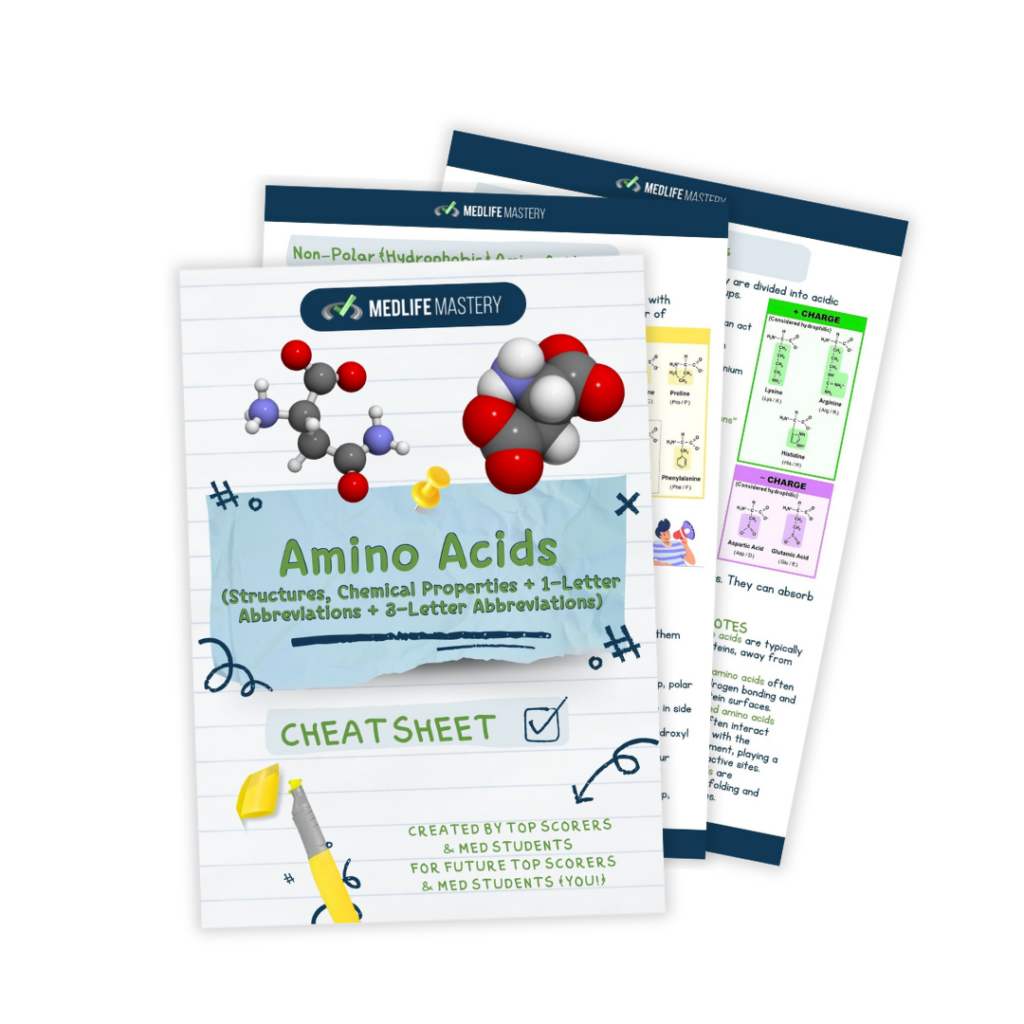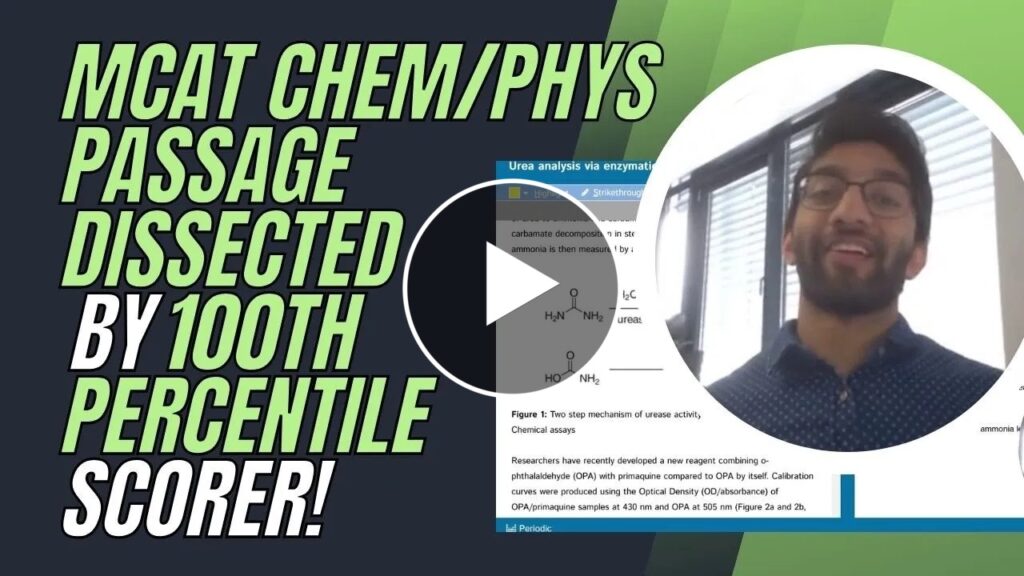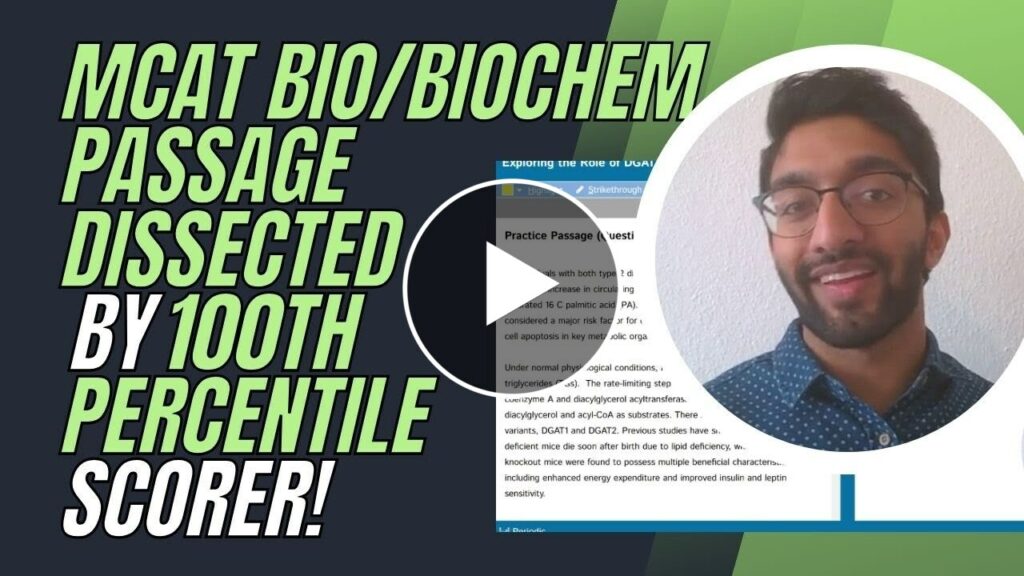Preparing for the MCAT is indeed a challenge. It covers a lot of scientific disciplines, one of which is chemistry. Therefore, MCAT chemistry preparation requires a lot of discipline and time management.
MCAT chemistry includes general chemistry, biochemistry, and organic chemistry. To succeed on the MCAT and get your desired score, you need to make an attempt to acquire the abilities and information needed for these three chemistry subjects.
This article focuses on MCAT organic chemistry.
If you want to know what it is, what topics it covers, and the best and most effective tips and tricks to ace MCAT organic chemistry, you are in for a treat! You will find all of these details here. Please keep reading.
What is MCAT Organic Chemistry?
The study of organic substances, which contain covalent connections between carbon atoms, and their structures, characteristics, and reactions is known as organic chemistry.
In organic chemistry, physical and chemical parameters are studied, and chemical reactivity is assessed to comprehend behavior.
Organic chemistry is covered in two MCAT sections: Chemical and Physical Foundations of Biological Systems (CHEM/PHSY) and Biological and Biochemical Foundations of Living Systems sections (BIO-BIOCHEM).
The MCAT Chem/Phys section includes 15% of organic chemistry. This means that out of 59 questions in this section, 9 require your organic chemistry knowledge and skills.
In addition, 5% of the MCAT Bio/Biochem section covers organic chemistry. That’s a total of 3 questions (out of 59).
Summary Table of Organic Chemistry Distribution in the MCAT
MCAT Section | Chemistry Subject | Percentage | Number of Questions (out of 59) |
|---|---|---|---|
Chemical and Physical Foundations of Biological Systems | Organic Chemistry | 15% | 9 |
Biological and Biochemical Foundations of Living Systems | Organic Chemistry | 5% | 3 |
Total Number of MCAT Organic Chemistry Questions: 12 | |||
Organic Chemistry Topics to Study for the MCAT
To properly prepare for the MCAT chemistry, you must be conversant with the many topics included in MCAT organic chemistry. Spend enough time studying these topics to feel confident before taking the MCAT.
On the MCAT, organic chemistry is addressed in the following areas:
10 MCAT Organic Chemistry Tips and Strategies to Ace the MCAT
The MCAT organic chemistry component could be challenging to prepare for. With many terms, equations, and diagrams to study and learn, you cannot help but be overwhelmed.
However, it is feasible to study MCAT organic chemistry without having to cram and achieve good results. You just need to know the tips and strategies to help you accomplish your MCAT goals.
You can benefit from the following pieces of advice to perform well on the MCAT organic chemistry:
Keep in Mind that MCAT Organic Chemistry is Just as Important as the Other Subjects
The first thing that you have to remember is that while there may not be a lot of organic chemistry questions on the MCAT (compared to physics and biology), it is STILL as important as the others.
You just cannot ace the MCAT if you do not perform well on MCAT organic chemistry questions.
First, medical schools consider more than simply your overall score while evaluating your application. Organic chemistry becomes more critical when they check your grades for each section.
As a result, even though it only makes up a minor portion of two MCAT sections, skipping organic chemistry questions will negatively affect your performance in these sections and reflect poorly on you.
Know What MCAT Organic Chemistry Aims to Assess
You will encounter research and experiment-style passages on the MCAT, an integrated exam that combines elements from various fields into a single passage and question.
You might be questioned about the optical purity of a recently produced experimental medicine.
You might not be explicitly assessed on aldol condensations. Still, you might be asked to explain how a single amino acid mutation in the active site of aldolase, the enzyme that catalyzes an aldol-like process in glycolysis, will affect glycolysis.
These are just some of the concepts included in the MCAT organic chemistry. On the days leading up to the MCAT, ensure that you fully understand what they are.
DO NOT Rely on Memorization Alone, Instead Focus on Application
All the questions on the MCAT involve multiple choices and applied concepts. Do not stress about remembering mechanisms while you review reactions.
Instead, be sure to check in with yourself frequently and ask these questions:
Focus on comprehending the logic, recognizing the patterns, and knowing what is happening.
Be Familiar with the Twenty Amino Acids' Structures, Chemical Properties, and Functional Groups
Knowledge of functional groups should be comparable to the knowledge of amino acids. You should be able to draw a ketone without thinking about it if someone asks you to. It should be simple and confident for you to accomplish.
Functional groups' intriguing chemical characteristics result from how they are made. Be certain that you comprehend these ideas completely before taking the MCAT.
Recognize Typical Organic Chemistry Experimental Methods Like Spectroscopy, Separations, and Purifications
These fundamental organic chemistry tools will be expected of you on the MCAT.
As technical and complex as they may sound, answering MCAT organic chemistry questions won't be too difficult if you focus and devote your time to studying what they are.
Before taking the MCAT, make it a point that you have mastered these concepts. Trying to understand the idea behind these processes may take a while but with the right materials, it should be manageable.
Answer Practice Questions
There is no better method to learn organic chemistry for the MCAT than by answering practice questions. While you will never see the practice questions you have answered on the actual MCAT, these practice questions develop the skills needed for you to ace the MCAT.
Instead, when answering an MCAT organic chemistry practice question, make sure you can explain why and when you would take each action.
Remember that the MCAT is not a memory exam. It is more application-focused, as was already said.
Analyze Every Right and Wrong Answer You Have
When answering MCAT organic chemistry practice questions, you must analyze and explain why you got them right or wrong. If you have someone to explain the equations and concepts to– it is better.
For the answers you get incorrect, note the information required to answer them correctly. This should be done for all practice questions you take, not just the ones pertaining to organic chemistry.
Have an MCAT Organic Chemistry Notebook and Take Notes
Every time you study for the MCAT organic chemistry, take notes. Notes should always be updated with new information as it becomes available.
Compare the notes to the other MCAT study materials you are utilizing. You can also use instances of challenges from the book or rewrite them in your own words to make the remarks clearer.
Make sure you review your notes a few days before the MCAT. Taking one more look at it should be manageable with the right materials. Referencing your notes is simpler than scanning your MCAT study guides for essential and detailed organic chemistry concepts.
DO NOT Procrastinate
When it comes to MCAT organic chemistry, procrastination is a nightmare because it cannot be learned in a single night. In organic chemistry, memorization only goes so far, and putting off tasks will only get you so far.
It is impossible to watch every lecture and attempt to learn everything in a short time, let alone the week before the MCAT.
Your brain requires some time to become accustomed to the new MCAT organic chemistry concepts and use them in various situations.
Utilize Every MCAT Organic Chemistry Resources Possible
Unquestionably, the MCAT organic chemistry prep materials you use will be your main source for organic chemistry learning and studying.
Organic chemistry does not require rote learning, unlike History or Literature. The content must be carefully investigated, studied in detail, and reviewed to ensure complete comprehension.
You can get MCAT organic chemistry preparation materials from various MCAT prep businesses, including Kaplan, Blueprint, and Princeton Review, and even here at MCAT Mastery.
As an alternative, you can find free online MCAT organic chemistry resources that will improve your understanding of the subject.
For your reference, here are a few MCAT organic chemistry free resources:
Additional FAQs – MCAT Organic Chemistry
What Type of Chemistry is on the MCAT?
Prior to taking the MCAT, you need to have a solid grasp of these three chemistry subjects to be able to achieve a strong MCAT score.
Does the MCAT Have a Lot of Organic Chemistry Questions?
Out of the 59 questions in the MCAT chem/phys, 9 (or 15%) are about organic chemistry.
Furthermore, the MCAT bio/biochem section includes 5% of organic chemistry.
That means that there are 3 questions (out of 59) that require your skills and knowledge about MCAT organic chemistry.
In total, 12 questions (out of 230), or 5% of the MCAT, are about organic chemistry.



 To help you achieve your goal MCAT score, we take turns hosting these
To help you achieve your goal MCAT score, we take turns hosting these 
























